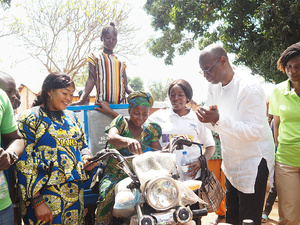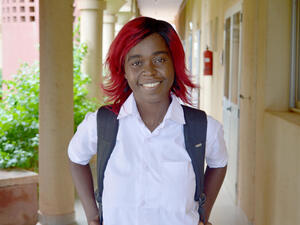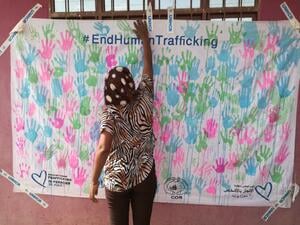Côte d'Ivoire: UNHCR welcomes government decision
Côte d'Ivoire: UNHCR welcomes government decision
UNHCR welcomes the decision announced this week by the government of Côte d'Ivoire to temporarily and partially suspend the demolition of shantytowns in Abidjan. This lull, announced Tuesday, should give us more time to organise assistance in already overcrowded sites housing nearly 1,000 newly homeless refugees. Most of the refugees are from Liberia and Sierra Leone, but also from Togo, Nigeria or the Democratic Republic of the Congo. They have been been sheltered for the past two weeks since their homes were razed in the government operation. We remain concerned, however, about continuing demolition in some areas - around military installations, for example - which is resulting in more homeless people.
Refugees started arriving at UNHCR offices after the September 19 coup attempt and the systematic destruction of shantytowns in Abidjan that followed shortly afterwards. The destruction of the shantytowns is apparently an attempt by government forces to root out alleged assailants who were accused of hiding in these districts. All refugees who have come for help have lost their homes and all their possessions. Many have reported harassment by security forces, some saying they had to pay 10,000 CFA (US$ 15) to avoid being arrested as "suspects."
The flow of refugees arriving at UNHCR offices has continued over the past few days, although to a slightly lesser extent. Some 950 refugees have been assisted so far, including 243 children. They are being transferred to five sites in different parts of Abidjan, where UNHCR and NGO partners are providing food, water and basic medical assistance. We are now looking at various options, including offering voluntary repatriation to the Sierra Leoneans and transferring other refugees to a refugee hosting area in the north-west.
UNHCR is also concerned about the ongoing displacement of Ivorians and foreigners throughout the country. Attacks against foreigners have increased in the last few days. There are reports that some 4,000 Burkina nationals working in cocoa plantations have fled from Yrzon and sought shelter in a Catholic church in the western town of Diokoué. An estimated 1,000 Burkina nationals have also reportedly fled to Man, in the west of the country. They reported fleeing their villages following attacks by machete-wielding youths. We hope that the message sent out by President Gbagbo on Tuesday calling for an end to attacks on foreigners will be heeded.
Some movements were also reported across the borders with neighbouring countries, mainly of nationals from Mali, Burkina Faso or Ghana returning to their country of origin. A joint UN mission to Sikasso (Mali) on the border with Côte d'Ivoire, reported the arrival of 2,283 persons since September 19. These include 1,268 Malian nationals, 194 migrant workers from different ECOWAS countries and 821 Ivorians. Most of the Ivorians are now living among the local Malian population in the border town of Zégoua and are self-supporting. None have approached UNHCR or expressed the intention to seek asylum. Most say they will return home as soon as the situation stabilises. Malian authorities have set up a tented transit centre that could host up to 500 persons.
UNHCR Ghana also reports that groups of people, mostly non-Ivorian nationals, have entered the country in various places since the beginning of October. Most are travelling in chartered buses, with no asylum requests from Ivorian nationals so far. The reported arrivals included a group of 931 Malian students who arrived on October 5 in 18 buses at Elubo border post, as well as 600 ECOWAS nationals, mostly from Burkina Faso, Mali, Niger, Benin and Nigeria. A few dozen Ivorians and Ghanaians have also entered Ghana through the Brong Ahafo region.
Finally, our office in Guiglo, in the south-west of Côte d'Ivoire, has also recorded small-scale movements of Liberian refugees in Côte d'Ivoire returning to Liberia. About 400 Liberian refugees are reported to have headed back to Liberia's Nimba county through Gbinta, Hapleu and Dohouba border crossings. These returns seem to have slowed following a series of meetings that UNHCR staff held with the frightened Liberian refugees in refugee settlements around Guiglo.






